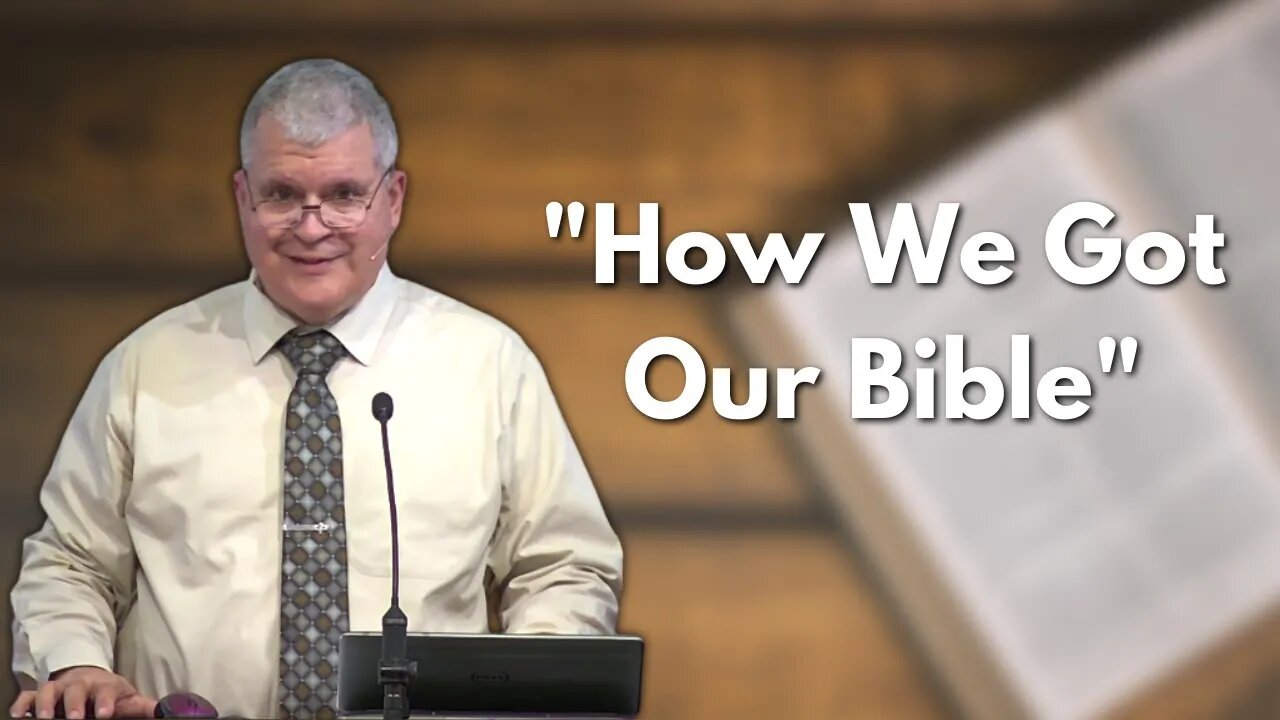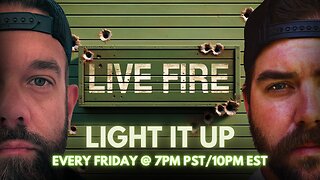Premium Only Content

LIVE - Calvary of Tampa PM Service with Dr. Bob Gilbert | How We Got Our Bible
Calvary Community Church of Tampa LIVE PM Service Service with Dr. Bob Gilbert
------------------------------------------------------------------------------
SUBSCRIBE https://www.youtube.com/c/bibleline
LIKE https://www.facebook.com/biblelinemin
TWEET https://www.twitter.com/biblelinemin
COMMENT ask us a question!
SHARE with all your friends and family
Do you have a Bible question? Send your question to questions@biblelineministries.org!
Support Bibleline - https://www.calvaryoftampa.org/donate/
Bibleline is a ministry of Calvary Community Church in Tampa, Florida and is hosted by Pastor Jesse Martinez.
LIKE THIS? CHECK THESE GUYS OUT:
https://www.youtube.com/c/Northlandchurchstc
(Tom Cucuzza)
https://www.youtube.com/channel/UCdddWVKMcM9c-SjUR1LZTBw
(Jim Scudder)
https://www.youtube.com/c/NorthsideChurchAthens
(Freddie Coile)
https://www.youtube.com/user/biblelinebroadcast
(Yankee Arnold)
https://www.youtube.com/c/TheKeesBoerMinistryChannel
(Kees Boer)
I talked about does the Bible version that we use does it really matter what version tonight I'd like to just start
and this is going to be a barely scratching the surface start into this thought where how we got our Bible how
we got our Bible and I guess that's going to be the way it is kind of dark but you'll be able to
see it I hope how we got our Bible I got mine given to me I don't know about you but that's not
really what I mean I gave this message kind of at Camp one time and it said went down to the Bible
bookstore and there it was that's how I got my Bible but how did it come to be available to us
as it is so freely now in our bookstores Psalm 68 verse 11 says the Lord gave the
word great was the company of those that published it and we're grateful for the
people in that industry and in the for the many many many centuries
centuries where the Bible given by God has been made correctly copied and published and
copied and published until we have it today this is not a well-designed slide but
it's actually an image instead of text and so I can't fiddle with it as easily if you can read it it's we're just gonna
go generally slowly through these first few points here what we do know the Bible
that we have the Bible is inspired by God we call it the Bible the Bible tends
to call itself scripture sometimes the word of God second Timothy
3 16 and 17 says all scripture is given
by inspiration of God and is profitable for
profitable for in correction for instruction for Doctrine thank you
for Doctrine or instruction correction for instruction
from for Doctrine for reproof for correction instruction that the man of God may be perfect throughly furnished
unto all good works thank you Dr Myers but it starts with this straightforward
statement all scripture is given by inspiration of God when Paul wrote that to Timothy
he was writing scripture himself I think he knew it
but when he referred to scripture he was referring to that which had been given down Through the Ages starting with
Moses and I think by the time Paul wrote that he probably had some of the gospels
Matthew Mark Luke perhaps were there as well for him to see I don't know
Paul's letters I believe are called scripture by the Apostle Peter in in his scripture II
Peter Paul in his letters calls Luke's gospel scripture on a par with Deuteronomy so
uh the Bible attests to itself that it is indeed scripture
second Peter chapter 1 verses 20 and 21 says
for the prophecy came is that right oh good for the prophecy came not in Old Time by the will of man but holy men of
God spake as they were moved by the Holy Spirit
these men of God Moses and Samuel and David and so many we could name and some
we can't name these men of God spoke and wrote as they were it says
moved by the Holy Spirit some of you I I like to sail a sailboat
do any of you sail I don't know no have you ever flown in an airplane airplane Wings have the same principle
involved as sailboat sails when you look at one it looks like the wind is just
pushing it but no there's a curved side and a backside to a sail on a sailboat
and to the wing on an airplane and if you can think about it simply the air has to go the same air hitting that
curve has to go further to get around the top of the wing than it does to go straight across the bottom of the wing
so if the same air is going further to get around then it goes straight across the air going further has to go faster
to come out at the same place and where the air is moving faster there's less pressure
which means there's lift to pull a wing up or if there's less pressure on the
curved side of a sail it pulls the sail along which is attached to the sailboat
and so it pulls the sailboat along that's how those things work and it's the word that's used holy men
of God spake as they were moved as they were born along not pushed but pulled
Along by the holy spirit of God inspiration of God it sounds like he
breathed in but really and truly it means he breathed it out he breathed out the word of God God gave the word
God gave the word he claims responsibility for it he used people
how do you understand that how could he write a perfect word of God using people like you and like me and like Moses and
like Samuel he used a woman Mary to bring his perfect son into the world
Mary wasn't perfect she's a regular woman she blessed above all other women but she's just a woman
and God used her he's superintended the putting together if you will of the body
that Christ took on when he became God the son he's
always been God the son but he became the God man he became the man Christ Jesus
when he was conceived and then born by Mary and God took the same kind of superintendent care for this book The
Bible Moses wrote Samuel wrote Mark wrote Luke wrote Peter wrote they're all different
men they all have different styles different vocabularies but God says what
got written down I'm responsible for that's the inspiration of God God claims
responsibility for it point two says the Bible is made of 66 books written over a
period of something like 1600 years if Moses was 1400 BC well it's going to be
only like 1500 years but we'll just be generous there from approximately 1500 BC to
approximately 100 A.D maybe 1600 I don't know more than 40 Kings prophets leaders
and followers of Jesus the Old Testament has 39 books written from about 1500 to 400 BC there's a long
period between Malachi and Matthew where there's no writing going on the New Testament has 27 books written
somewhere between 45 and around 100. some people question whether any of the
New Testament books could have been written after 70 A.D because something drastic happened in 70 A.D that would
affect everything the Roman general Titus destroyed the Jewish temple in Jerusalem
and dentist that's such a huge event it changed Israel it changed God's people there forever you'd think it would have
been noticed it would be hard to write anything in that part of the world without that having an effect so we
suspect that the books are written before 7080 except possibly John and the Revelation and maybe John's letters I
don't know but uh most of it written down before 70 A.D
the standard Hebrew Bible today the Bible that Jewish people that use the Bible use has the same text as the
English Bible's Old Testament we call it the Old Testament they don't
but it's still the same books we call it 27 excuse me we call it 39 books they
call it 22 books they lump the 12 Minor Prophets together as one book they
include Lamentations with Jeremiah there's a couple other just ways that they arrange things differently we go
the pentateuch the historical books the poetical books the prophets that they
have just three divisions the law the prophets and the writings and they put them all in those three categories but
it's the same books it's the same books the Old Testament was written mainly in
Hebrew that was their language what happened in the 500s BC though was
a captivity of Judah and Benjamin by the Babylonians Nebuchadnezzar the great
king took them all off captive they left very few people in Judea
and so they're living in captivity in the Kingdom of Babylon
where the language is like Hebrew but not the same it's called Aramaic or Chaldean
and so some of the Book of Daniel some of it is written in Aramaic or
Chaldean but it's so much like Hebrew that you really don't have to do another whole language you just use a slightly
different part of the dictionary and you if you can read Hebrew you'll figure it out if you can read Hebrew you can
figure anything out it's tough the New Testament was written in Greek
you say well that's that's Greek to me why was it written in Greek why was it written in Greek did
something happen that made Greek an important language there was a
the Greeks didn't think of him as Greek but a fellow named Philip up in Macedon had a desire to be thought of as
cultured and educated like the Greeks down in Athens and all those other really Greek places and so he gave great
gifts of money and built a huge temple in the in Olympia where they had the games going and and they they patronized
him but they didn't really think he was very Greek so he had a son his son he hired a Greek educator to
teach his son his son's Educator's name was Aristotle you've perhaps heard of Aristotle Socrates had a people named
Plato Plato had a pupil named Aristotle they were philosophers Aristotle who had
a pupil named Alexander Alexander was not a philosopher Alexander was a man of war like his
father and where his father had basically exerted his sway over just Greece
Alexander took the world and took the world with his Greek
culture that he claimed for himself with him and so from Spain and up in northern
Europe all the way out to India Greek became the language because that's what Alexander had you might wonder why are
there Alexandria's all over the place there's one in Virginia Alexander the Great Concord Virginia no that's not why
but there's an Alexandria in Egypt there's an Alexandria here and there and everywhere in the Middle East because
they kept naming cities after the Conqueror Alexander the Great he's known as
he took Greek everywhere he pacified people everywhere
then Rome came Rome did have a different language but they wanted to be known as cultured as
well and so they kept Greek for the language of culture they did make Latin their legal language back in Italy but
everybody had Greek already so they left it Greek what Rome did was really pacified the
whole of Empire that had been Alexander's built roads took the Pirates out of the
Mediterranean there was a peace over the whole Mediterranean world called the pox
Romana the Peace of Rome and people could travel from one end to the Empire to the other
and and be safe relatively speaking and God says you know at the in the
fullness of time at the very best of times God sent his son made of a woman made under the law
the very best of times in the Peace of Rome God sent his son Jesus so that not
only he could die for sins but then the word of it could get out to all the world
number four says the books of the Bible were collected and arranged and recognized as inspired sacred authority
by councils of rabbis and councils of church leaders based on careful guidelines I want you to know I didn't
write this and I don't exactly agree with that they were
recognized as sacred authority by the congregations
by the the synagogues of the cities of the Jews and the congregations of the
churches across the Empire there was nobody sitting up there said well you and me we're in charge here we'll see we
take Jeremiah I'm not real clear about Ecclesiastes we'll take lamentation they didn't do that
it wasn't the councils that determined the councils did meet and wrote down what the people had agreed this is God's
word and this is not God's word it was not
top-down deciding what belongs in the Bible and what didn't there were other
in the first century other gospels so-called gospels Thomas and Judas and
Peter all people put their names on books they'd written and claimed to be gospels of Jesus and they were not and
they were not accepted they were never any competition they were recognized as spurious and the
ones that belonged were recognized as belonging by the people the quality of them continued to be recognized
so it wasn't so much the councils of rabbis did write down that they had
recognized the Bible the Old Testament as we have it in a certain Council called jamnia but
they were just recognizing what had already been recognized by the people of Judaism and the church leaders did recognize in
the fourth and fifth century and 6th Century what the people of the churches of Europe had come to conclude these are
the books and no others it was the people that determined that God gave it to the people
number five is kind of obvious before the printing press was invented the
Bible was copied by people taking out their smartphones and taking pictures of each page no no that wasn't it it was copied by
hand the Bible was copied very accurately in
many cases by special scribes who developed intricate intricate methods of
counting words and letters to ensure that no errors had been made what do you mean counting words and letters well
there were distinct Pages even though they were sometimes scrolled they were still a page had two columns or three
columns and then around to the next but every page the letters were counted all the a lifts
in the Old Testament all the baits all the gimbals all the dollots they'd count and know the total number of any
particular letter on a page and when they made a copy they'd count the letters again and made sure it was
the right number of each letter of the alphabet they'd count specific words and get the
word count right they'd find the middle word of each page and make sure it was
the middle word they'd find the middle word of each book they'd all kinds of just mechanical devices to check that
had been copied accurately to ensure that no errors had been made
did it work oh it worked so very well but we came away from copying by hand
and we're so glad we did I remember growing up with the the paper
in elementary school that Bill Cosby described as a paper so rough that it
still had chunks of wood floating around in it and give you a pencil as big as a horse's hind leg and you set one end up
on your shoulder and you write a B teacher can have another piece of
paper I'm sorry I still like Bill Cosby if he was one of my friends when I was young
I know he's a mess now the Bible was the first book ever printed on a printing
press with movable type called the Gutenberg Press in 1455 it
was a Latin Bible it was not an original
Greek or Hebrew Bible it was a translation of the Latin Bible that was the one done by Jerome in the 400s
called the Latin Vulgate by his Publishing Company who liked that name
because it was already a popular name they used the name Latin Vulgate on
earlier Latin translations and Jerome used it and swiped it I'm thinking
number seven there is much evidence that the Bible we have today is remarkably
true to the original writings of the thousands of copies made by hand
before 80 1500. this document that I'm reading from says
over 5300 Greek manuscripts from the New Testament alone still exist today
I knew this was done a few years ago and so I looked it up and as of as of
yesterday or the day before in Wikipedia it now says over 5 800 Greek New
Testament manuscripts have been discovered why does the number grow because we're
still discovering we're still finding it's not like they're making more man use scripts
handwritten documents they just haven't found them all yet so when somebody says the oldest
manuscript says they don't know it's the oldest one we might know about
so far but it's not necessarily the oldest oldest the text of the Bible oh I
should I'd throw a little extra stuff in here in the Greek language there's over 5 800 documents handwritten manuscripts
of the New Testament in the Latin language of these early Latin translations there
are over ten thousand manuscripts of the New Testament in other languages another
9300 handwritten manuscripts in Syriac one of the early before Latin
there was Syriac the church you remember in Antioch of Syria they not only used
Greek and Latin and Hebrew but they had
their own language called Syriac it's not far different from the Babylonian language but one of the earliest
translations and many of them still survive in manuscript form the Syriac
the Slavic up into Europe the Slavs were reached early the gothic Gothic I didn't
realize until a few years ago when I was teaching this is kind of an ancestor to English
you I don't know if you've ever seen the Dutch language we when I was a nine-year-old kid we
drove through Holland and we could see Billboards on the side of the road and if we tried to understand the words we
couldn't but if we read them out loud we knew what they were saying because the language sounds like English
it just doesn't look like English so we just phonetically pronounced and Gothic is like that you can lay a Gothic text
of of a familiar passage down and if you've pronounce what it looks
like it says just pronounce the letters you'll sort it out you'll be able to understand it it's not a magic thing
languages have a lot in common so anyway Slavic Gothic ethiopic is from
Ethiopia Coptic is another Egyptian area language Nubian further down into Africa
and Armenian which is the sad sad place in the parts of what we call Turkey now
where the huge group of Armenian ethnically Armenian people were
slaughtered in the beginning of the 20th century the great genocide happened there and the Armenians were just about
wiped out but those languages there are seven other languages besides Latin that the New
Testament exists in 19 300 copies in the other languages and
and 5800 in Greek there's a lot of evidence of what the text of the New Testament was
there's not much doubt of what the text of the New Testament was the text the
Bible the slide goes on and says the text of the Bible is better preserved than the writings of Caesar and Plato
and Aristotle I've got on my shelves at home a copy of Caesar's Wars and Plato's stuff and some
of Aristotle stuff I don't read them I just have them just be you know show off and I'm an educated person but
we I of course have them in Translation I don't read Caesar and Plato and Aristotle in their original language but
nobody doubts the English version of Julius Caesar's gallic Wars that we have
is probably pretty close to what he wrote but there's something like seven
manuscripts of Julius Caesar garlic Wars and fewer of Plato and
Aristotle I mean there's just things that everybody accepts are so much more
they're poorly attested compared to the New Testament it is hugely better
number Eight's interesting the discovery of the Dead Sea Scrolls confirmed the astonishing reliability of
some of the copies of the Old Testament made over the years
although some variations exist mostly spelling variations no variation effects
basic Bible doctrines in the Dead Sea Scrolls just to briefly mention this there are they were found
in the late 1940s early 1950s the kids are out playing near the rocks and with the rocks and throwing rocks at each
other and they miss each other and they toss a rock down into a cave and they hear this crash and oh that sounds like
Mama's pot Mama's vase broke and he went and looked and sure enough his randomly thrown rock into this cave
had hit an Earthen jar and it broke and made the noise and inside the Earthen
jar were some old manuscripts handwritten Scrolls
and they found lots of them and they've so far and still finding
things but so far since the 19 late 1940s found copies of
among other things mostly Bible but some other things as well but all the books of the Old Testament except Esther
why not Esther I don't know that's the only thing I can think about Esther is
that it doesn't include the name God there's been noticed that Esther doesn't mention the name of God she certainly
the the story of Esther certainly reveals the hand of God the Providence of God but it doesn't use his name
so maybe these people didn't like Esther I don't know but those Scrolls that were
found in the 1940s and 50s and still today being found
we're done we're written between 150 200 ish BC and 70 or 100 A.D
that's when they were written and produced and put in the jars and put in the caves and left alone
there's one very very complete Scroll of the book of Isaiah in the
in Jerusalem now they have its own museum for these these copies of the
Bible they call it the Shrine of the book it's a round-shaped building and in the center of it the core of it has a
facsimile uh exact copy of this Isaiah scroll wrapped around the center so you
can walk from one end of Isaiah to the other and read it if you read Hebrew and I think I read that it differs from
the copy of Isaiah that we use behind our King James Bible the masoretic text in seven words
in all of Isaiah seven words I'm going to stick to it until somebody corrects me that's what I think
nothing that affects Doctrine Isaiah is the best preserved of all those books of
the Old Testament in that matter we're going on at number nine as the Bible was carried to other countries it
was translated into the common language of the People by Scholars who wanted to know God's word
today there are still it says 2 000 groups with no Bible in their own language I think that number may be of
shrunk somewhat but it's still over a thousand people that don't have the Bible in
their own language they may be able to access the Bible in a language that they use for a trade language but there are
still groups that have no access to the written word of God because they don't have any written language understanding
that's a shame by ad200 the Bible was translated into
seven languages I read off eight so I don't know which one was earlier by 8 500 into 13 Languages by ad 900 into 17
Languages by 80 1400 into 28 languages by 1800 into 57 languages by 1900 into
537 languages and by 1980 more than 1100 languages were getting at it but it's
not done yet I'm going to leave that list and go looking now at kind of a timeline
around 1500 BC Moses is instructed by God it says it in the book to write
to write there are people that when Jesus said Moses wrote they said oh
Moses didn't know how to write that's an old tradition that's a myth that's a fairy tale but Jesus
said Moses wrote and I'm not one of those that's willing
to say Jesus was wrong I'd rather suggest that the supposed scientists that say they didn't have writing in
Moses day might have been mistaken because Jesus said Moses wrote
and God used Moses and told him to write down the law for the people the first five books of the Old Testament Genesis
Exodus Leviticus Numbers in Deuteronomy called the law of Moses called the
pentateuch that's a Greek name for the five books it was written in Hebrew of course
between then and 400 BC the whole rest of the Old Testament was written books of history and prophecy and poetry are
written by Samuel Maybe by Joshua we didn't name Joshua
here but by Samuel and David the king and Solomon the king and Daniel the boy
who was carried captive over to Babylon and yet received such great prophetic
understanding and help from God to survive Ezekiel the Prophet Jeremiah the
prophet and the other Amos and the other prophets and just most of it in Hebrew a little
bit of Aramaic between 500 and 400 BC scribes copy
these books as Originals wear out that does happen
this that I'm using here tonight as as a copy of the Bible has some places in it
that are worn out and I don't use this very much because of that I can turn the pages
in the New Testament and some places that they just fly off and lay on the floor until I pick them up again it's
worn out when they wore out they made copies you might remember that
the Kings of Israel were each one instructed to write for themselves a
copy of the law not just read it day by day for themselves but they had to write their own copy
the Kings had to now I'm not sure they all did but that was what it was in the instructions
in around 450 Ezra who's returned from captivity
to rebuild and re-establish the worship in Jerusalem
he collects and arranges the books according to Jewish tradition
and so perhaps in around 450 the books that had been written up to that point are put together in a volume there's the
Books of Moses that they did have together before that and the books of history and the
prophets and the writings and we call it the Old Testament because
we've got a new testament or a new covenant
between 250 and 100 BC somewhere in that time frame
the Hebrew Bible the scriptures were translated into Greek by Jewish Scholars because there was a lot of Greek
speaking going on since Alexander the Great most people call the Greek translation
the Septuagint that's kind of a bogus name but it everybody knows what you mean by it so
it's okay to use it there were many Greek translations of the Old Testament that were done
in around 300 A.D a scholar a Christian scholar though
he's kind of heretical a Christian scholar named origen in the city of Alexandria published a book that had the
Hebrew text and six different Greek texts of the Old Testament
it was called the hexapla there's a lot of Greek translation of
the Old Testament that's been done there wasn't just a Septuagint the reason I said the name Septuagint is bogus well
the word means 70. there's a fairy tale kind of explanation
that somebody wrote down in a letter much later than
any others happened that said well the story I got was that they got 72 not 70
but 72 men from Israel to go down to Alexandria they put them in 72 different rooms with
their writing materials they gave them copies of the Hebrew Bible and these 72
men in 72 days each produced the whole Bible in Greek
and there were all 72 identical copies when they came out they were all identical as do you see why I'm calling
that a myth and a fairy tale that's not a very good answer but certainly it was translated
the the quality of it varies there is something published by zondervin today
called the Septuagint it's an English and it's for English people to use it's got the Greek text and it's got English
forwards and notes and things in it but it's not the
Septuagint I don't know what the Septuagint is
can you use it well I wish I could I read Greek a whole lot better than I read Hebrew and I don't read Greek that
well but it'd be easier if it was just right but it's not
some places even the the chapters in the Psalms are numbered different and you get lost trying to find something the uh
the the verses are numbered differently it's just wrong here and there it's not
as well done as just following the Hebrew original it's just not as good it's an early witness to the state of
the Hebrew Bible but the uh the Hebrew Bible is better so
somewhere between 100 BC and 100 A.D the Dead Sea Scrolls were produced thereabouts copies of portions of Old
Testament books and other writings sealed in clay jars and hidden in caves until we found them in around 1947-48.
somewhere between 6 BC and 30 A.D Jesus came I'm not going to worry about the dates I didn't make this as I said
around 45 to 100 Matthew Mark Luke John Paul Peter Jude James
write letters and historical accounts to churches and Friends throughout the Roman Empire they quote from all but
eight of the Old Testament books now I haven't checked that out but that's an interesting thing they're using the
Hebrew Bible they're using all of it almost I wonder what the eight are I'd
have to search that out someday from 100 to 500 A.D the writings of
Jesus followers we call the New Testament are translated from Greek into other languages and spread across the
world as far as India and China this says around two to three hundred Christianity reaches Britain
I might challenge that later on too there's a church
I'm trying to remember the name of the town I saw it last night on television but I
can't say it now there's a church in England that claims that they were started by Joseph of Arimathea
now I don't think that's necessarily true but that's interesting that they would make that claim they also claim
that in their town the remains of King Arthur are buried so obviously everybody in england got a little hold of this or
that story but when in around 480 the pope sent
missionaries of Roman Catholicism to go to England they didn't go to take an unknown story
of Christianity to these pagan people they went to get these people who were already Christians fixed because they
were not Catholic because there's been Christianity in Ireland and Scotland and
the various whales and the parts of England there had been a Christianity
there before Catholicism ever got there they didn't like it because they had
Easter on the wrong day they didn't like it because they didn't have the calendar the same they didn't
like it for a variety of reasons that's another part of the study but Christianity did get early to Britain
there is I should mention there is a I can't back up this and I'm
going to back up this way there you go there's a poem that still exists I think in an eighth
it's either a 14th century or an 8th century French document that quotes an
earlier poem that claims to be from the 400s that talks about Paul making it to
Britain that's an early myth an early story but who knows how far Paul went when he said
I want to get to Spain it's just around the corner and up the hill there and there he is so I don't know Christianity
got to Britain early somewhere between 250 and 350
the leaders of the church they called The Church fathers they accept the writings of the gospels and Paul's
letters as canonical from a Greek word that refers the word Canon it refers to the ruler a Canon was a piece of cane
like down in the the Nile Valley there with a bull rushes are Cannon cane they
use them for rulers you know to draw a straight line or to measure short distances and Canon refers to it's
straight and it also refers to it's the ruler it's the the determiner of you
know what's 12 inches that's a foot canonical means it comes up to it
measures up literally it measures up now this again presents it as though the
leaders made the decision the councils did meet they made lists
but the the uh they really were just recognizing what the people of their
churches had recognized the churches sent Messengers they sent their pastors they sent their their their priests
their Bishops whatever to meet in these councils and they said we we use these 27 what do you we use the same 27 well
that's good that's good they met and they um
listed the same 27 books that we used today in the New Testament
ad325 is given as the date of the Codex we
call vaticanus a codex is a book it's a book as opposed to a scroll
the vaticanus it's as a fine early handmade copy of nearly all the Bible resided in the
Vatican Library since 1481. it says was released to scholars in the
early in the late 1800s uh they they still sat on it they did not want it to
come out it is fine it is early
but it has paid page after page after page where there's been attempts to
erase and rewrite and there's places where it's it's a problem to tell what
it originally said it just is and it's been in the Vatican Library since 1481 and yet it was written in
maybe 325 it's Greek which you say that's great it's the New
Testament right yeah but it's also the Old Testament in Greek oh
hmm I wonder which one they used it's pretty
most of the manuscripts of the Greek New Testament get used get worn out Pages
fall out you gotta put them together hold them with a rubber band this one's pretty
why they kept it hidden away they didn't use it
sinaiticus dates maybe a few years later another fine early handmade copy of all
the New Testament part of the Old Testament again in Greek it doesn't have any Hebrew in it discovered in 1844 at what is called
Saint Catherine's Monastery at Mount Sinai by a man named tischendorf and he bought it
or stole it I'm not sure but 1859 is the date they give to when he got it it's
supposed to date from 350. it's these two not these two excuse me sinaiticus
and one other one called alexandrian manuscript that the British
museum bought from the Russians before it was the Soviet Union
um those are both those two that are in the British Museum library in London I've seen them in their case they didn't
let me handle them they're just really pretty they've not been handled
this discovered in 1844 in the monastery
um these the people that write about it say it was in a waste bin
it was getting ready to be burned they weren't going to keep it to use it these two vaticanus and synaticus are the ones
that you might find referenced to if you use an other than King James Bible and look in the margin here and there and it
says the oldest and best manuscripts have or have the they use that phrase oldest
and best they're talking about these two vaticanus and sinaiticus they're old that doesn't make them the best
in the western part of the Roman Empire the language
more and more and more was Latin by 400 A.D most of the western part of
the Roman Empire couldn't do Greek the eastern part of the Roman Empire
centered on Constantinople Istanbul now used to be called Byzantium
they speak Greek they're Greeks this is Greece and Turkey and all of that part
of the Middle East they Greek was their language until the Arab Conquest Greek was the language
they still today use the same Bible that they used in the first century
they don't need it translated it's in Greek that's their language so there are thousands of manuscripts
from that part of the world they wrote them down they used them up they
copied over they were in the west they went to Latin they
translated it 410 it says Jerome is commissioned by Pope damasus damasus to translate the
Bible into Latin they called it the Latin Vulgate took 22
years to do you know what took 22 years to do he was pretty good in Latin and
Greek he didn't know a bit about Hebrew he about like I am so he moved from Rome to Bethlehem that
Bethlehem right outside of Jerusalem and he hired himself a rabbi and he sat
down with him and said can you teach me Hebrew and he said son I could easier do this for you than teach a Hebrew but
they worked on it and worked on it and worked on it 22 years he finally said all right it's going to have to do we got to get this out there
and they called it the Latin Vulgate now Vulgate is a word that means the common
Bible the Bible that all the people will use right like it's it's not a bad word
it's a word that means common like the word we say vulgar today and think it means bad but it doesn't it just means
every day common the Greek language has a word like that it's koine it means the common language
the common Greek the Greek the choosed on the street in English we just call it everyday English
The Vulgate he took the name that had already been in use I think there was a center of
learning in Antioch of Syria the same place that sent Paul and Barnabas out to do missions work where they had
people that understood Hebrew and Greek and they had people coming back to them from the mountains of Italy and of
Switzerland and France we would call it saying we're Christians but we don't have the Bible in a language can read
and they said well here we'll help you get from Greek and Hebrew into your
language into Latin and so translation's done I think an Antioch of Syria from
the Greek text of the Bible that was the same as what we use today and they got
called the old Latin text the old Latin text
exists in those mountains in Europe it exists some places in North Africa
and it predates Jerome's work by 200 years but it got known as the common Latin
Bible that got known as the Latin Vulgate and when Jerome got the official version ready to go he said we're going
to use their name and he called his The Vulgate of Jerome
stole the name and made them call theirs well that's the old land that's different
let me back up just a second I skipped one
4 30 it says Patrick evangelizes Ireland
I told you it was early Patrick was born in what we would call
Scotland his father was a deacon in the church
a deacon I don't know the structure of the church but I know a deacon is more important than somebody that's not a deacon and he rebelled as a teenager he
didn't want anything to do with that and then the Irish Pirates came and captured
his whole place and took him as a slave back to Ireland
and Patrick in Ireland keeping pigs sounds a lot like The
Prodigal Son keeping pigs and he prayed he said get me out of here God if you're really a real God get me
out and he just walked away from the pig farm and headed for the coast and God said go to the coast and he went to
the coast and there's a boat there loading animals and he says you got to take me God sent
me to he said when I would take you he says I'll I'll help you with the animals and so they took him and he wanted to
just go back to Scotland the storm took the boat all the way over to France
and he goes ashore in France and he's hungry and tired and eventually makes it
back to Scotland but he's a changed young man and he he's gotten a hold of God
he somehow has understood the gospel and he's he feels good God wants him
back in Ireland where the Pirates took him to share the gospel with those that had made him a Slave and he does that
and he's very successful and hundreds and hundreds are saved and baptized in
Ireland well one of his followers years later
steals a copy of the book of I think it was Psalms from his the guy that owned
it one of the Lords of Ireland to make himself a copy of it and he made a copy and he'd get put back the
original the guy says that's mine too and he's anyway it was a bad bad choice there was
a lot of bloodshed and so the followers a generation later of Patrick escaped
back and they don't go they go to a little place kind of far up north in Scotland a little island called Iona
and they start what the Roman Catholics like to call a monastery but it's a
Bible College they start a bible college and they start teaching the Bible and they don't just teach the Bible they
get them fired up and the young graduates of the Bible College go out not just to Scotland and not just to
England but to the all of Mainland Europe and down into Italy and over to the far the Middle East I mean they go
and go and go they're still in Rome the evidence of them having been there
it's they they live on but we're not the first
we're not the first we're going to run out of time here and I I know I droned on for a while this is not the best way
to present this I've just been boring and I'm sorry we're going to get some more visual aids there is I suppose the
first Polaroid picture of Jerome that was ever done
30 42 maybe to 420 the first Christians wrote their New
Testament in Greek and joined it to the Greek Septuagint translation of the Old Testament years later the language of
the Common People was language instead of Latin instead of Greek and so Jerome was asked to do the whole
thing and well well I I'm going to be finished with John's gospel in Sunday School here
in just another week and I think I'm going to pick this study up in Sunday school time so if you if you're
interested in it it'll be there and it'll be better than just this dry dry talk that I did tonight but there's a
lot of information that we haven't time to to cover tonight the young people are here from Awana but
before I let it let them do something if they need to you need to understand if you're watching this
we have a Bible that tells us about salvation Once Upon a Time uh 15 year old boy was
tricked into going to a Bible study where he heard best thing he'd ever heard
he saw a man do this he said this hand represent you and me this wallet represents sin we've all got sin on us
this represents Jesus the verse in the Bible says he made him who knew no sin
to be sin for us that we might be made the righteousness of God in him
and that night I heard first John chapter 5 verse 13 these things have I
written unto you that believe on the name of the son of God that you may know that you have eternal
life God wrote it down when I went in that meeting that evening
I was not in the group it was written to but that night I joined the group that said yes I
believe on the name of the son of God and that verse of the Bible First John 5 13 was written to me that I may know
that I have eternal life because I'm in the group that believes in Jesus
what he did on the cross makes it make sense he died in my place he paid the penalty for my sin
and he gives me his perfect righteousness when I have to stand in front of God his power heads and close our eyes
if you've heard this tonight and you wondered why he's rattling on about that it's all because this Bible means so
much to us it's how we have any knowledge of God but we wouldn't
we just wouldn't have much to talk about if it wasn't for the truth that I just
mentioned you can know that you have eternal life you can know that when you die you'll go to heaven and you can only
know that if you realize Jesus did what he did for you he was the Son
of God the one God sent to be the substitute for us
as Trent said so well this morning God the Father looked on the suffering
of Jesus soul and was satisfied he was satisfied for my sins
and I believe in Jesus if you've never before believed in Jesus there's no more to it than that
you don't join a group I said those words but you don't join a group you just believe in Jesus that puts you in
the group that believe on the name of the son of God and when you're in that group the Bible says you can know that you have eternal
life I hope you'll do that if before before it's ever too late just between you and God
I don't understand everything he said God but I hear Jesus died for me and I I
believe in him promises to you you may know that you have eternal life
you believe on the name of the son of God Father in Heaven thank you for this word of God and the great confidence we
can have in it how so many so many over the so many hundreds of years worked so very hard to
keep it right so that we could have it today and know it is your word thank you for that in Jesus name amen do
we have any awards
-
 11:13
11:13
BibleLine
15 hours ago"Is The Sinner's Prayer NECESSARY for Salvation!?"
17 -
 5:03:49
5:03:49
Drew Hernandez
12 hours agoLA MAYOR PUSHED $49 MILL LAFD BUDGET CUT ONE WEEK BEFORE FIRES?
73.5K26 -
 2:52:04
2:52:04
Nobodies Gaming
7 hours ago $4.25 earnedNobodies Rumble Gaming TEST STREAM 2.0
48.2K3 -
 1:00:36
1:00:36
Talk Nerdy 2 Us
7 hours agoDigital Surveillance, TikTok Shutdowns & The Hackers They Don’t Want You to Know About!
38.6K2 -
 3:08:37
3:08:37
SpartakusLIVE
9 hours agoDelta Force || Tactical, Strategic, HARDCORE
48.9K2 -
 3:32:05
3:32:05
I_Came_With_Fire_Podcast
13 hours agoTRUMP GUILTY Verdict, LA Fires, New American EXPANSIONISM, and Cyber Truck Updates!!
24.8K11 -
 1:26:05
1:26:05
Glenn Greenwald
10 hours agoGOP Senators Demand Tulsi Support Domestic Surveillance To Be Confirmed; Group Tracks IDF War Criminals Around The World; System Pupdate: Pointer's Determination To Survive | SYSTEM UPDATE #387
116K67 -
 57:27
57:27
Flyover Conservatives
1 day agoHealthy People Are Ungovernable: The Secrets They Don’t Want YOU to Know - Tracy Beanz | FOC Show
58.9K6 -
 8:36:11
8:36:11
Dr Disrespect
17 hours ago🔴LIVE - DR DISRESPECT - DELTA FORCE - INTENSE SITUATIONS ONLY!
251K27 -
 4:01:30
4:01:30
Nerdrotic
13 hours ago $35.57 earnedHollywood National DISASTER! Studios Terrified, Star Wars FAIL | Friday Night Tights 336 w Raz0rfist
148K46